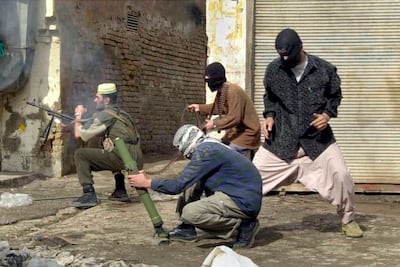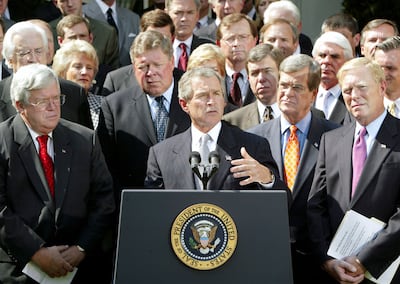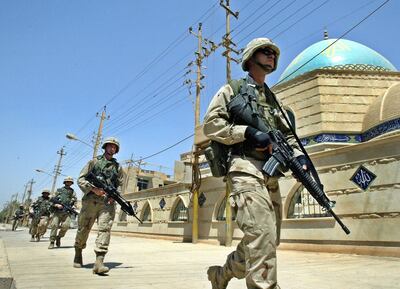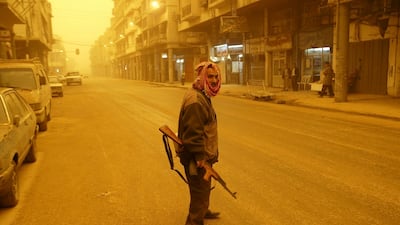“There was mistake after mistake. I’m sorry, I can’t talk about it, I get emotional.”
Mohammed’s voice breaks as he discusses the chaos that followed the US invasion of Iraq and the country’s descent into a civil war that tore his community apart — and caused at least 210,000 civilian deaths.
The former vet grew up in the sleepy town of Yusufiyah, south of Baghdad. The rural community lies in an area later dubbed “the triangle of death” after 2003, when Mohammed signed up as an interpreter with US forces.
As his mixed-sect Sunni-Shiite tribe was split, caught between Al Qaeda and Shiite terrorist groups, he says he thought this was his best option to help because the Iraqi army “was still disorganised”.
“I lost colleagues who were killed in clashes while on their way to a farm to treat animals. I thought ‘I can't help being a vet, I’ve got to do something’,” he says.
With a college friend who died in the early years of violence, he signed up as a linguist, hoping to help tribal leaders to communicate with US forces to discuss detained Iraqis and humanitarian issues.
Mohammed believes the US lost precious months to stabilise postwar Iraq and avoid civil war, because of boldly optimistic assumptions about a postwar Iraq.
The National spoke to former senior US commanders, Coalition authority administrators and Iraqis, who said decision-makers in Washington were determined to keep US force numbers low, leaving inadequate troop numbers to secure vital infrastructure and communities.
Within 18 months of the invasion, Mohammed’s neighbourhood was in the grip of full-scale conflict.
“Al Qaeda would take a few people and kill them in front of their families or in the market to be an example and then the rest would leave,” he says. The violence ushered in what he says were equally thuggish Shiite groups promising to “defend” communities.
The terrorist groups took advantage of a sudden power vacuum in a country the size of California, with wide-open borders.
“There wasn't a plan,” remembers Keith Mines, a civilian administrator and veteran diplomat who was sent to set up a local government in Anbar, home to the battle-scarred city of Fallujah.

“The military, especially under General Tommy Frank's leadership, just wanted in and out,” he says, referring to the general who oversaw the invasion and co-ordinated with Donald Rumsfeld, who at one point wanted almost all US troops out of Iraq within 90 days.
Mr Mines says optimistic assumptions about stability made the postwar period “much harder than it needed to be”.
While many Iraqis were deeply opposed to foreign military intervention, others sensed opportunity with the end of harsh international sanctions and the toppling of the brutal Saddam Hussein regime.
“There were new employment opportunities, from basic workers, to engineers, even when violence levels were rising. Sources of income that weren't available before,” recalls Mohammed.
He says the small economic boom soon became meaningless after “the worst decision” the US made.
De-Baathification disaster
Coalition Provisional Authority Order Number 1 in May 2003 prohibited the top three senior levels of Saddam’s Baath party from remaining in public employment.
America’s new allies in Iraq, mainly “exiled politicians”, Mohammed says, rapidly expanded the order, with CPA head Paul Bremer’s consent, to the lowest levels of the party, which included teachers and hundreds of thousands of civil servants. It gutted ministries of qualified staff, while most ministry buildings had already been burnt by looters.
“When the Coalition stood by and allowed looting, this further shattered the rule of law in the early period and that could not be easily rebuilt,” says Michael Knights, an Iraq expert at the Washington Institute for Near East Policy, who visited Baghdad shortly after the invasion.
Infamously, the army was also dissolved, leaving hundreds of thousands of disgruntled soldiers on the streets, many of them armed and willing to start an insurgency against the Coalition.
Mohammed, who originally supported the war, says it was “the biggest single biggest mistake they did”.
“And, yes, everything collapsed after that,” he says.
Within a year, an energised insurgency had wreaked havoc across most of Iraq. America’s already lacklustre reconstruction plans — just $2.48 billion was allocated by Congress in April 2003, could not get off the ground.
A further $18.4 billion would be allocated in November 2003, part of a $60 billion US effort. But as the insurgency gained pace, targeting oil infrastructure and Iraqis working with the new government or Coalition, security expenditure soon ate into reconstruction funds.

According to a detailed US State Department study, The Future of Iraq Project, $18bn would barely have covered electricity reconstruction alone.
“The period immediately after regime change might offer criminals an opportunity to engage in acts of killing, plunder, looting,” the project said in 2002.
With the most resources, the US Army took the lead on reconstruction, when many said it was primarily a civilian job.
That year, General Mike Barbero was second in command of the US 4th Infantry Division and remembers his early efforts to support CPA reconstruction.
“We had this bifurcated leadership with a three-star command, and then the CPA, which were oftentimes at odds with each other. We're trying to set up schools and get the country running again, but there was no strategic plan for phase four,” he says, referring to reconstruction.
“So we're out there doing our own thing, setting up regional elections, trying to get schools back and their schoolteachers and starting to get them certified. And then the CPA issued Order Number 1, but of course under Saddam the teachers had to be members of the Baath party,” he says, noting that membership did not mean loyalty to Saddam.
It was a decision that left Mr Mines begging the CPA to reinstate de-Baathified teachers and other public servants, in what would soon be the most dangerous part of Iraq.
Peter Mansoor commanded a brigade of US soldiers in Baghdad in the spring of 2003 and later worked as the executive officer to David Petraeus, overall Coalition commander.
He says the lack of troops was accompanied by lack of guidance from the CPA and very little to work with after the looting of April 2003.
“We were establishing a facilities protection service to provide armed guards to protect what was left, but the damage had already been done. And the problem is there were no rules of engagement for US troops to deal with looters. Do you shoot them? Do you arrest them?
“The military has no real arrest authority over civilians, so what do you do? And then you get Donald Rumsfeld saying ‘freedom’s messy’. It was just a stark realisation that the administration had no idea what it was doing, and hadn't looked at what had happened in other places like Panama when the regime collapsed.
“And immediately it led to massive looting, almost in every instance historically.”
Lack of understanding
Many US commanders found themselves taking a crash course on Iraq’s complex society as the insurgency gathered pace.
“Until we got our feet on the ground, we didn't fully understand the leanings and nuances of Sunnis, Shiites and Kurds. And this pressure cooker that Saddam sat on, and held control of, which when the top came off, it blew up. We had no understanding or discussion about that. We also totally underestimated the Iranian influence and its corrosive impact,” Lt Gen Barbero says.
Mr Mansoor recalls a “sharp firefight” after his forces entered a Shiite mosque near Karbala.
He says: “It was full of ammunition. It was basically a Jaish Al Mahdi (Shiite militia) ammo depot. And my commander on the ground, a captain, wanted to just blow it up. I said, ‘you’re not going to blow it up, it’s a shrine'.
“It might have been militarily the right thing to do just blown in place, but then we would have destroyed the mosque and that would have of course, had a huge political and social blowback in the community.”

“We had no intelligence preparation of the battlefield (IPP). IPP is a process where the intel is looked at and you develop an idea of what the situation will be. And that was obviously very flawed, because there was nothing on an insurgency,” Lt Gen Barbero recalls.
This lack of situational awareness and lack of troops allowed insurgents space to plan and recruit, setting the stage for civil war that would go on to claim at least 3,000 lives per month at its height in 2006.
“I've got 2,500 soldiers in my brigade combat team. And I've got two million Iraqis under my jurisdiction,” Mr Mansoor says of his time in 2003.
“So that's one soldier for every 500 civilians. You look at the police force in New York, you have one policeman for every 200 New Yorkers and there's no insurgency there. And the US counterinsurgency field manual says you need one counterinsurgent for every 50 civilians. So we are off by a factor of 10.”
Crisis in Fallujah
The lack of security meant that civilians who went to work on reconstruction soon found themselves in life-or-death situations.
“I got there in the summer of 2003,” recalls Mr Mines.
“So we're just a few months in. I started in Hillah, just for a few days before I could get to Anbar and the fact that there was nobody in Anbar was really quite stunning. I mean, that kind of says it all, here's 1.2 million people, a third of the country's geography.
“They're tribally divided, majority-Sunni, and many are ready to take on the Coalition and the new government. And nobody is there. And then I'm sent out with a suburban, a computer and a phone, alone, to sort of govern this. It was really quite stunning when you think about it.”
About 65 kilometres from Mr Mines, Mohammed watched as his home community slowly descended into violence.
Within a year, US forces had pulled back from Fallujah, a prelude to Al Qaeda taking over and a bloody US effort to reclaim the city.
Further troop drawdowns would occur until early 2007 when the US decided to send around 30,000 reinforcements to the conflict, changing strategy to focus on working more closely with Iraqi tribes and re-training security forces.
This new approach, known as the "Surge," along with a brief Shiite militia ceasefire and a Sunni uprising against Al Qaeda helped stabilise Iraq, at least until the rise of ISIS after 2012.

Before that happened, "we ceded the terrain and the civilian population to the tender mercies of the insurgents, Al Qaeda terrorists and the Shiite militias, and then they started fighting for turf,” Mr Mansoor says.
Norman Ricklefs, a civilian advisor and academic working with Coalition commanders between 2005 and 2011, agrees.
"We discovered that violence increased greatly as Coalition troops were removed. Two combat brigades were withdrawn between December 2005 and January 2006, and it became clear that rather than exacerbating violence, they had been keeping the lid on a simmering conflict that then rapidly accelerated following the withdrawal of forces."
Following the 2004 Fallujah operations, the insurgency showed little sign of waning. Hundreds of Al Qaeda fighters were now attacking Mohammed’s community, tearing at the fabric of his mixed Sunni-Shiite tribe.
By 2005, he went from interpreting for local meetings with the US to volunteering for dangerous operations in Anbar with US forces, speaking proudly of fighting alongside Sunni tribes against Al Qaeda.
“We have a branch of our tribe that lives in Fallujah, and they are Sunni. And we are cousins,” he says.
But the war would severely damage the fabric of his community. Before the war, “normal people weren't paying much attention to the difference between Sunni, Shiite,” he says. The Coalition’s project for new governance in Iraq made sect a “basis for judgment,” he says. “It was mistake after mistake.”






























